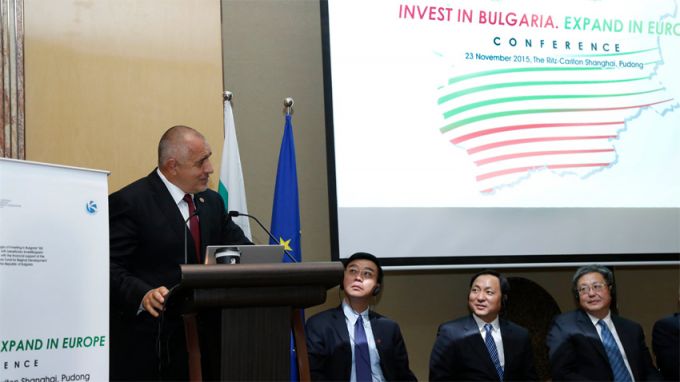
Bulgarian Prime Minister Boyko Borissov and seven other Bulgarian ministers are in China for the fourth meeting of the Asian colossus with government leadersof 16 much smaller countries of Central and Eastern Europe. The meeting is generally interesting for all partners. China's global expansion and the currently slowing Chinese economic growth need new markets and customers. Meanwhile small and not very developed but also the richer countries of Central and Eastern Europe urgently need investments to boost their economies.
Bulgaria did not miss the opportunity to offer everything to the powerful Chinese industry, agriculture, finance, transport and tourism. At a business forum in Shanghai organized by the Bulgarian Investment Agency, 40 Bulgarian companies participating in the delegation tried to find Chinese partners among hundreds of companies working in various spheres. Bulgarian government officials such as Deputy Prime Minister TomislavDonchev and Minister of EconomyBozhidarLukarskiaimedat attracting Chinese investorsto Bulgaria. The biggest advantage pointed out was the opportunity for China to expand in Europe.
The Bulgarian market is tootiny for the global Chinese ambitions, and the Bulgarian economy is not yet able to offer much to Chinese buyers except for yogurt and some metal products. Still, China remains the second biggest trade partner of Bulgaria among the countries outside the EU. China is even ahead of traditional trade partners of Bulgaria like Russia. Still figures show that Bulgaria mostly imports from China and exports too little there.The Chinese market is incredibly competitive and Bulgarian goods sink into the sea of Asian products.
Therefore, experts and politicians believe that the chances of Bulgaria to attractthe attention of Chinese investors are much higher if this country was considered a member of a larger regional group. This is actually the point of the high-level conference, which began today in the city of Suzhou with the participation of 16 Central and Eastern European countries. Not coincidentally, Bulgarian Prime Minister Boyko Borisov focused onlarge-scale regional investmentsin the spheres of energy, transport and telecommunications, as well as in the automotive industry.
Speaking of cars, it will be good to mention the example of Chinese auto giant Great Wall, which built a factory for assembling cars in Bulgaria and then began exporting them to Europe. This is a type of project that is attractive to the Chinese. Even if the whole Bulgarian government went to Beijing oranother Chinese metropolis, the results would remain at the level of yogurt, if there was no large-scale thinking. It is very nice to make plans for making Shanghai and Sofia sister cities, but this is unlikely to bring actual benefits for the business.
English version: Alexander Markov
The Bulgarian Stock Exchange (BSE) will participate in the event "EU-Chambers Business Chill with the Bulgarian Stock Exchange," according to a post by the BSE on Facebook. The event is being organised by the Hungarian-Bulgarian Chamber of..
Under the name BGBizHub, Bulgarian entrepreneurs in Berlin have joined forces to promote and develop their businesses in Germany. "Like any other business, not only in Berlin or in Bulgaria, we currently face several problems -..
Bulgarians are consuming less bread, cheese and vegetables, but more fruit, according to the latest data from the National Statistical Institute on household consumption in the third quarter of 2025, compared to the same period last year...

+359 2 9336 661
